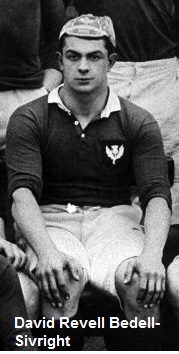David Revell Bedell-Sivright
12 mars 2018

David Revell "Darkie" Bedell-Sivright (8 December 1880 – 5 September 1915) was a Scottish international rugby union forward who captained both Scotland and the British Isles. Born in Edinburgh, and educated at Fettes College where he learned to play rugby, he studied at Cambridge University and earned four Blues playing for them in the Varsity Match. He was first selected for Scotland in 1900 in a match against Wales. After playing in all of Scotland’s Home Nations Championship matches in 1901, 1902 and 1903, Bedell-Sivright toured with the British Isles – now known as the British and Irish Lions – side that toured South Africa in 1903. After playing the first 12 matches of the tour, he was injured and so did not play in any of the Test matches against South Africa.
The next year Bedell-Sivright was appointed captain for the British Isles team that toured Australia and New Zealand. Due to a broken leg he played only one Test match during the tour – against Australia – but was involved in a notable incident during a non-Test match. Despite not playing, Bedell-Sivright pulled the British team from the field for 20 minutes after disputing the decision by a local referee to send-off one of their players. Bedell-Sivright eventually allowed his side to resume play, but without their ejected teammate.
Following the tour Bedell-Sivright briefly settled in Australia, before returning to Scotland to study medicine. He captained Scotland against the touring New Zealanders in 1905, and in 1906 helped his country defeat the visiting South Africans 6–0. After retiring from international rugby in 1908 he went on to become Scotland’s amateur boxing champion. A surgeon by profession, he joined the Royal Navy during the First World War, and died on active service during the Gallipoli Campaign.
Bedell-Sivright had a reputation as an aggressive and hard rugby player, as well as a ferocious competitor. He was an inaugural inductee into the Scottish Rugby Hall of Fame, and in 2013 was inducted into the International Rugby Board (IRB) Hall of Fame.
The 5 September, he died of septicaemia and was buried at sea off Cape Helles. He is commemorated on the Portsmouth Naval Memorial.
Rugby career :
Bedell-Sivright learned his rugby while a student at Fettes College like Tony Blair, but first came to note as a player when he represented Cambridge University in the Varsity matches – contested against Oxford University – between 1899 and 1902 ;[4] this won him four sporting Blues.[13] He was first capped for Scotland in 1900 in a match against Wales at St Helen’s, Swansea.[14] The match was a turning point for Welsh rugby, who won 12–3,[15][a] but the selectors stuck with Bedell-Sivright who won another 21 caps for his country.[1] He is the only Scottish player to have won three Triple Crowns – wins over Ireland, Wales and England within the same Home Nations Championship (now the Six Nations) – in 1901, 1903 and 1907.
In 1903 Bedell-Sivright was selected for his first match with invitational touring side the Barbarians. He played a total of five games for the side between 1903 and 1907, and captained them against Cardiff RFC in 1907.
Bedell-Sivright was later chosen to tour with two different British Isles teams. The first was the 1903 tour of South Africa under the captaincy of fellow Scottish international Mark Morrison.[18] Although at the centre of the British Isles pack, Beddel-Sivright did not play in any of the test matches. He played in the first 12 tour matches, where the team won six and lost six, but was injured thereafter.
A captain of a team, like a general of an army, has an important part to play, and with every point he must be acquainted, or else disaster will almost invariably befall his side. The British team now on its way to Australasia will, judging from what one can learn, be well served in the way of leadership. D. R. Bedell-Sivright, who has been chosen as the skipper, has had vast experience as a leader.
G. W. McArthur, selector of the 1904 British Isles team, on Bedell-Sivright.
The five-match New Zealand leg of the tour was far less successful for the British team.The tourists won their first two matches, but their third – the sole Test against New Zealand – was lost 9–3. Bedell-Sivright did not play in the Test after injuring himself in the teams’ first New Zealand tour match,[25] but blamed that loss, and their subsequent draw and loss (the final loss was 13–0 to Auckland) on fatigue after their tour of Australia. According to a New Zealand newspaper, Bedell-Sivright only ever claimed his side was "stale" after a loss, and never before.[26] A New Zealand representative side was scheduled to tour the British Isles in 1905, and Bedell-Sivright did not report favourably on their chances of success. This may have contributed to the Home Nations underestimating the All Blacks – as the 1905 team become known – who ended up winning all but one of their 35 matches.
Writing in 1919, rugby journalist and author E. H. D. Sewell said of Bedell-Sivright "If a plebiscite was taken on the question : "Who was the hardest forward who ever played International football ?" Sivright would get most votes if the voting was confined to players, and probably so in any event." Bedell-Sivright is described as one of the "hardest" men to ever play for Scotland, with author Nick Oswald – who wrote a book on the history of Scottish rugby – describing him as "a very aggressive forward. He didn’t excel in any one aspect of the game, but he was an absolutely ferocious competitor.
